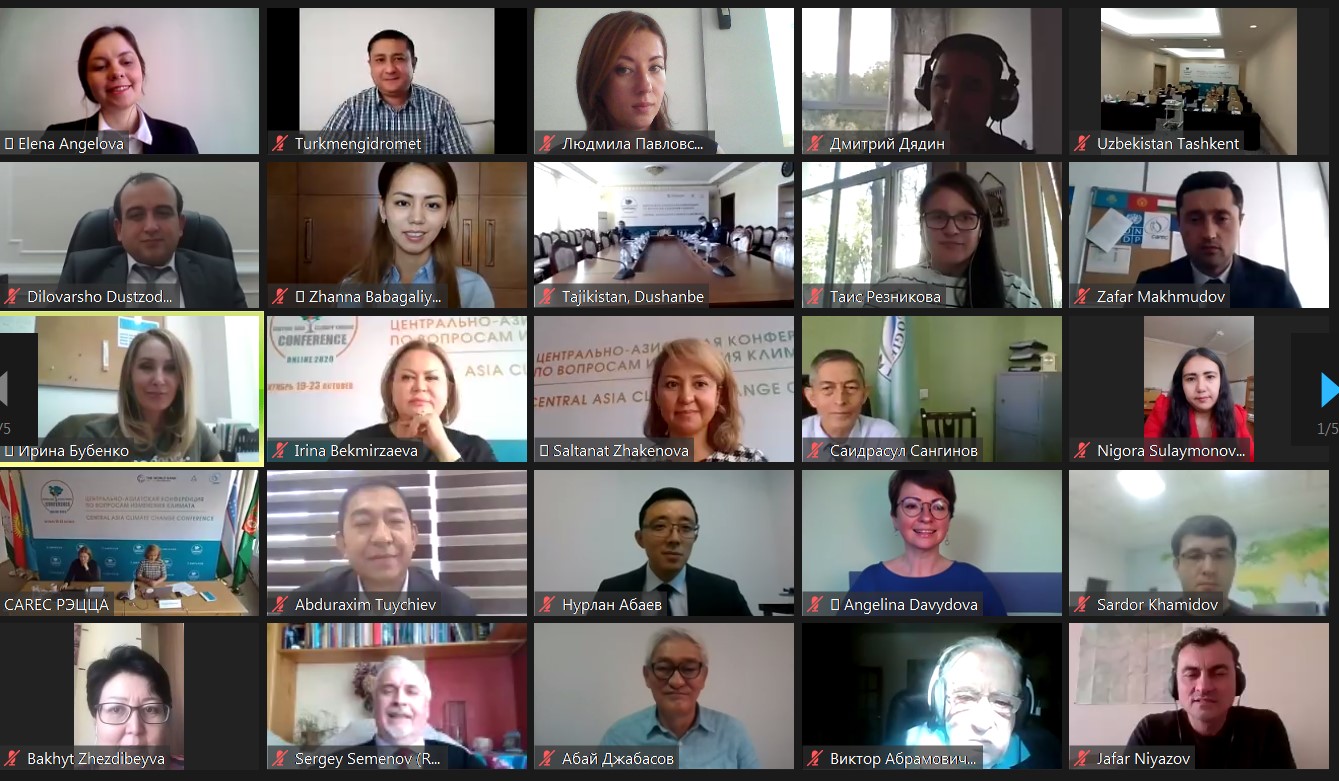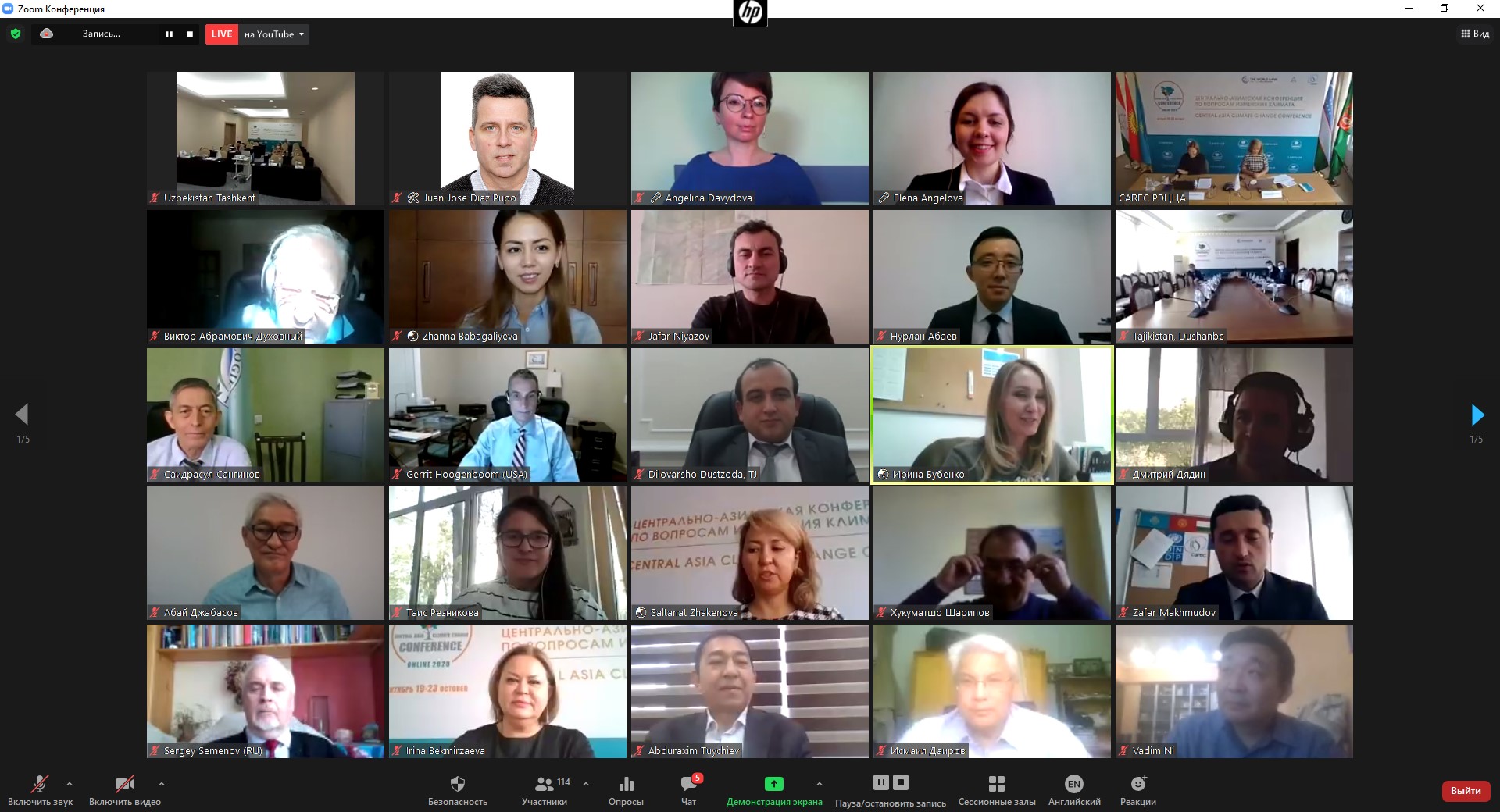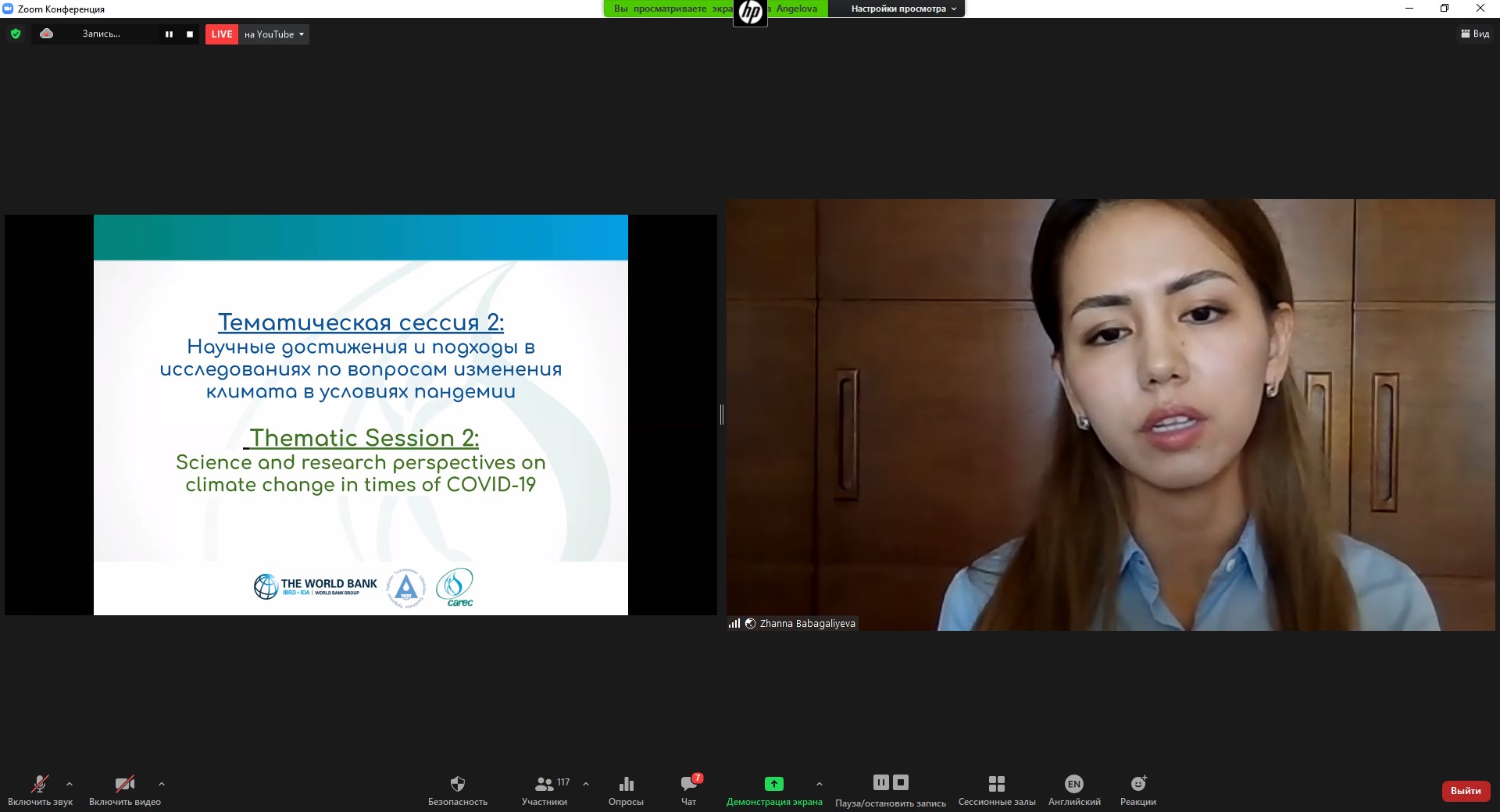
On October 20, 2020, scientific and research aspects of climate change were in the thematic focus of the Third Central Asian Conference on Climate Change (CACCC 2020).
This thematic session's main objective is to draw the participants' attention to existing and emerging studies on climate change, which may open up new opportunities for innovative science-based research in times of pandemic, and discuss modern methods and tools for performing such studies in Central Asia.
The Intergovernmental Panel on Climate Change (IPCC) is globally recognized as the leading organization on scientific aspects of climate change. This organization develops periodic assessment reports as well as special reports on various aspects of climate change. The thematic session of the second day of CACCC-2020 began with the presentation "Possible scientific foci of the IPCC Seventh Assessment Report cycle" by Dr. Sergey Semenov, Vice-Chairman of Working Group II of the Intergovernmental Panel on Climate Change (IPCC).

In his presentation, Mr. Semenov noted that the Intergovernmental Panel on Climate Change was established to address the challenge with the complexity of the data on climate change for policymakers' decision-making. He also noted that IPCC does not conduct studies itself, and the organization reviews the available research data by the development of assessment, special and methodological reports. Mr. Semenov told that these reports are available for the public on the organization's website, www.ipcc.ch. He stressed the importance of the concept of "risk" for the preparation of the Fifth and Sixth IPCC Assessment Reports of the IPCC and provided a detailed explanation of this term. Mr. Semenov also touched upon the fact that the assessment of many climate risks is possible at the global level, whereas available data might be insufficient to make such climate risk assessments at the regional level. He provided some examples when such data are available to make the regional assessment, namely, on impacts of climate change on the areas of distribution of the Italian locust and mosquitoes as a transmitter of malaria.

In Central Asia, the hydrometeorological agencies are the key sources of climate data based on long-term observations of weather, climate, water resources, extreme meteorological and hydrological events. Climate change has made various extreme events more frequent and increased the risks of negative consequences for the economy, society and ecosystems. Reducing these climate risks requires the application of new methods and tools for observation and research.

Mr. Nurlan Abayev, Director of the Scientific Research Center of the national state enterprise "Kazhydromet" presented new methods and tools for climate forecasting and simulation. He noted in his presentation that Kazhydromet applies modern tools for the work with climate data. It concerns satellite data, computer simulation on water flows of rivers, snow cover, crop yields and that the CAMP4ASB project assists with their application. Mr. Abayev also presented some trends in climate change in Kazakhstan. Every 10 years, the average annual temperature increases by 0.3 ° C, five years in a row (2015-2019), maximum temperatures were recorded. The temperature rise is higher in falls, with 2019 having the fifth record year in a row for temperatures. The observations show the increase in the frequency of various dangerous weather events over the past decade, e.g. twice on floods on mountain rivers, a significant decrease in the surface and volume of water in the snow cover.

The Regional Environmental Centre for Central Asia works actively with different foreign universities specializing in applied climate researches. One of the organization's partners is the University of Florida, and CAREC cooperates with this university on yield forecasting in climate change conditions.

Within the framework of the thematic session of the second day of CACCC-2020, Dr. Gerrit Hoogenboom, a professor from the University of Florida, made the following presentation “Yield Forecasting using the DSSAT Crop Model”. In his presentation, Mr. Hugenboom noted that agriculture is a complex system that depends on many natural, socio-economic, management and other factors. Therefore, it is essential to use computer models and experimental data to reduce uncertainty and risks in predicting future yields. He further presented the DSSAT model used to predict agricultural yields operating with a wide range of data, including those that take climate change into consideration. The model currently allows forecasting for at least 40 crops, including wheat, rice, soybeans, etc. He demonstrated good convergence of the predicted data on the DSSAT model and data on the actual wheat yields in the Akmola region of Kazakhstan.
In the course of further discussion on the scientific and research aspects of climate change, the participants of CACCC-2020 also touched upon the following issues: the possibility of engagement of scientists from Central Asia in the preparation of IPCC reports; training students at universities and experts within the framework of specially organized seminars; the practical significance of various computer models used for forecasting crop yields; the impact of a global pandemic on field research capabilities; criteria based on which Central Asia is considered as one of the most vulnerable to climate change regions in the world.

At the end of the second day of the conference Ms. Zhanna Babagaliyeva, CAREC/CAMP4ASB, summed up the session by the following key messages:
● In the face of climate change and quarantine measures caused by the pandemic, there is a need to expand existing methods of conducting climate research, in which consideration is given to modern approaches to the use of satellite data and tools for forecasting future climate scenarios and associated hydrological and agrometeorological indicators.
● The role of leading national, regional and international research institutes that assist the countries in the region in adapting new tools and conducting targeted research in meteorology, hydrology and agriculture is evident. It is important to consider research results in the process of the climate-related policy development, its pursuance and monitoring of its implementation in order to timely and effectively respond to consequences of climate change.
● The countries of the region represented by the scientific community should be more active in participating in research on climate change and developing regional reports, new IPCC assessment reports and help improving the quality and quantity of evidence-based information on climate change in Central Asia.
● CAREC, which received an observer status in the IPCC, plays an important role in coordinating this process by attracting international scientific expertise and providing a platform for exchange of information on new climate research, conducted within the framework of implementation of the CAMP4ASB project and other initiatives.
● Development of new training modules on the use of innovative modeling tools in Universities, is the basis for training of young specialists.
You can find the CACCC 2020 speaker’s presentations at the link: http: http://gofile.me/3xIiD/hId9gulpD
Climate Adaptation and Mitigation Program for Aral Sea Basin or CAMP4ASB is implemented by CAREC and financed by the World Bank. Project aims to enhance regionally coordinated access to improved climate change knowledge services for key stakeholders (e.g., policy makers, communities, and civil society) in participating Central Asian countries as well as to increased investments and capacity building that, combined, will address climate challenges common to these countries.CAMP4ASB is implemented in Kazakhstan, Tajikistan, Turkmenistan and Uzbekistan during the period from 2016 to 2021.

